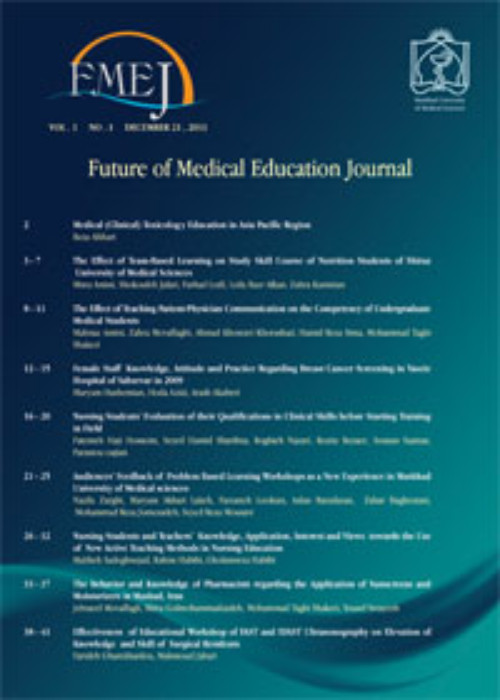Translation, Cultural Adaptation, and Reliability of Nursing Student's Belongingness Scale--Clinical Placement Experience
Author(s):
Abstract:
Background
Considering the limitation of reports on the translation of research questionnaires, the present study aims to clarify the necessity of correctly conducting the translation process. Therefore, it deals with describing the process and the required stages for the cultural adaptation of research instruments in an operational style. Consequently, it may provide a platform for researchers to pay more attention to this important issue. Methods
Levett-Jones et al.’s (2009) Belongingness Scale--Clinical Placement Experience (BES-CPE) includes 34 items and three subscales of self-esteem, connectedness, and efficacy in 5-point Likert scale. It was translated and studied for cultural adaptation according to Wild et al.’s (2005) model. Following the preparation of the final questionnaire to evaluate reliability, instrument consistency was studied using test-retest method, with a two-week interval, and completing the questionnaire by 25 nursing students. Moreover, internal consistency was evaluated through Cronbach’s alpha. Result
During the processes of translation, back translation, and review, six items were corrected and the observation of cultural equivalences was also considered in the questionnaire. Then, in the process of acquiring cognitive debriefing and review, results of interviewing a number of students indicated that some items are problematic. For instance, the results are ambiguous. Thus, five items of the questionnaire were changed. The reliability of the instrument was obtained as r=0.70 through test-retest replicability method. Cronbach’s alpha was 0.90 for the whole instrument. Moreover, the values of Cronbach’s alpha for the subscales of self-esteem, connectedness, and efficiency were 0.88, 0.75, and 0.84, respectively. Conclusion
Complete record of translating the instrument, especially when it is translated into another language and culture, proves important for optimum use by other researchers. In the present research, this problem was eliminated. The results indicated the high reliability of the instrument. Therefore, the questionnaire can be used for measuring the nursing students’ belongingness in Iranian clinical settings.Keywords:
Language:
English
Published:
Future of Medical Education Journal, Volume:4 Issue: 3, Sep 2014
Pages:
22 to 25
magiran.com/p1310783
دانلود و مطالعه متن این مقاله با یکی از روشهای زیر امکان پذیر است:
اشتراک شخصی
با عضویت و پرداخت آنلاین حق اشتراک یکساله به مبلغ 1,390,000ريال میتوانید 70 عنوان مطلب دانلود کنید!
اشتراک سازمانی
به کتابخانه دانشگاه یا محل کار خود پیشنهاد کنید تا اشتراک سازمانی این پایگاه را برای دسترسی نامحدود همه کاربران به متن مطالب تهیه نمایند!
توجه!
- حق عضویت دریافتی صرف حمایت از نشریات عضو و نگهداری، تکمیل و توسعه مگیران میشود.
- پرداخت حق اشتراک و دانلود مقالات اجازه بازنشر آن در سایر رسانههای چاپی و دیجیتال را به کاربر نمیدهد.
In order to view content subscription is required
Personal subscription
Subscribe magiran.com for 70 € euros via PayPal and download 70 articles during a year.
Organization subscription
Please contact us to subscribe your university or library for unlimited access!


